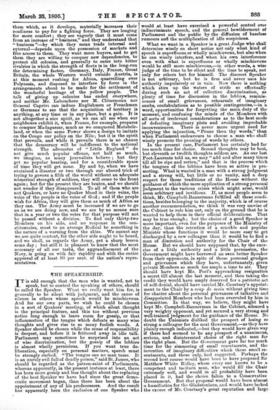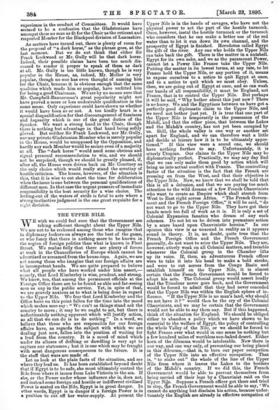THE SPEAKERSHIP.
IT is odd enough that the man who is wanted, not to speak, but to control the speaking of others, should be called the Speaker. What we really want him for, is generally to be silent with judgment, and the cause of silence in others whose speech would be mischievous. And for our own parts, we wish he could be chosen in a sort of Quakers' meeting, of which silent thought is the principal feature, and this too without previous notice long enough to leave room for gossip, or that inflammation of the tongue which defeats so many wise thoughts and gives rise to so many foolish words. A Speaker should be chosen while the sense of responsibility is deepest, and before it is frittered away in idle talk. Parliament may sometimes be surprised into an act of wise discrimination, but the gossip of the lobbies is almost wholly pernicious. If you want true de- liberation, especially on personal matters, speech must be strongly curbed. "The tongue can no man tame. It is an unruly evil full of deadly poison," said St. James, who should be regarded as the patron-saint of Parliaments, whereas apparently, in the present instance at least, there has been more gossip and less thought about the replacing of the best Speaker we have had since the great demo- cratic movement began, than there has been about the appointment of any of his predecessors. And the result has apparently been the exclusion of one Speaker who would at least have exercised a powerful control over indiscriminate speech, and the general bewilderment of Parliament and the public by the diffusion of baseless rumours and the multiplication of idle suspicions.
What we want in a Speaker is a great Judge who shall determine wisely on short notice not only what kind of speech is superfluous or wholly mischievous, but also when he can wisely interfere, and when his own interference even with what is superfluous or wholly mischievous would be still more mischievous,—in other words, a wise judge of the time to be silent and the time to speak, not only for others but for himself. The discreet Speaker is not arbitrary, but he is firm and never uses his authority impulsively or in vain. Now there is nothing which stirs up the waters of strife so effectually during such an act of collective discrimination, as plenty of time for discussion in the lobbies, reminis- cences of small grievances, rehearsals of imaginary snubs, confabulations as to possible contingencies,—in a word, opportunities for forgetting the main duty of the moment, and confusing the minds of the Members with all sorts of irrelevant considerations as to the best mode of defeating imaginary plots and avoiding improbable inconveniences. There is never more urgent need for applying the injunction, "Prune thou thy words," than when Parliament endeavours to choose a man who shall wisely promote the pruning of words by others. In the present case, Parliament has certainly had far too much time for choice. Second thoughts may be best, but eleventh or twelfth thoughts seldom are. As our last Poet-Laureate told us, we may "add and alter many times till all be ripe and rotten," and that is the process which the tongues of the lobbies have been so active in pro- moting. What is wanted is a man with a strong judgment and a strong will, but little or no vanity, and a deep respect for those traditions of the House without the guidance of which the mere application of a strong personal judgment to the various crises which might arise, would seem arbitrary and invidious. If, as most people seem to think, Mr. Campbell-Bannerman fulfilled all these condi- tions, besides belonging to the majority, which is of course another recommendation, we think it was very unwise of the Cabinet to rule him out, only on the ground that he is wanted to help them in their official deliberations. That may be true enough; but the choice of a good Speaker is more important, even for the purposes of the Ministry of the day, than the retention of a sensible and popular Minister whose functions it would be more easy to get discharged by a new colleague than it would be to find a man of discretion and authority for the Chair of the House. But we should have supposed that, by the exer- cise of a little authority and a little persuasion, the Government might have borrowed an even better Speaker from their opponents, in spite of those personal grudges and grievances which they have, unfortunately, given private Members so much too ample a time to air. They should have kept Mr. Peel's approaching resignation a secret till almost the last moment, and then taking the credit they would have amply deserved for a patriotic act of self-denial, should have carried Mr. Courtney's appoint- ment to the Chair by a coup de main without giving time for chatter about the personal grievances of talkative and disappointed Members who had been overruled by him in Committee. In that way, we believe, they might have kept Mr. Campbell-Bannerman in the Cabinet, silenced a very weighty opponent, and yet secured a very strong and well-trained judgment for the guidance of the House. No doubt the Unionists disliked the prospect of losing so strong a colleague for the next Government,—as they have plainly enough indicated,—but they would have given way if there had seemed to be any prospect of a unanimous, serious, and disinterested choice of the right man for the right place. But the Government gave far too much time for the simmering of small resentments, and the invention of imaginary difficulties which these small re- sentments, and these only, had suggested. Perhaps the second best course would have been to have proposed Sir Matthew White Ridley, whom every one knows to be a competent and taciturn man, who would fill the Chair extremely well, and would in all probability have been placed in it, had the choice fallen to a Conservative Government. But that proposal would have been almost a humiliation for the Gladstonians, and would have lacked the excuse of Mr. Courtney's great reputation and large experience in the conduct of Committees. It would have seemed to be a confession that the Gladstomans have amongst them no man as fit for the Cbair as the reticent and respected Member for the Blackpool division of Lancashire.
As matters have turned out, there is plenty of room for the proposal of "a dark horse," as the phrase goes, at the last moment. But we do not think that either Sir Frank Lockwood or Mr. Gully will be that dark horse. Indeed, their possible claims have been too much dis- cussed to render it proper to speak of them as dark at all. Mr. Gully is too little known, though he is very popular in the House, as, indeed, Mr. Mellor is very popular, though no one has even thought of naming him for the Chair, because it is obvious enough that the same qualities which made him so popular, have unfitted him for being a good Chairman. We are by no means sure that Mr. Campbell-Bannerman's great popularity might not have proved a more or less undesirable qualification in the same sense. Only experience could have shown us whether it would have been so or not. A too kindly heart is a special disqualification for that discouragement of fussiness and loquacity which is one of the great duties of the Speaker. We want a strong hand in the Chair, though there is nothing but advantage in that hand being softly gloved. But neither Sir Frank Lockwood, nor Mr. Gully, nor any private Gladstonian Member who is merely popular in the House, would be unopposed by the Opposition, and hardly any such Member would be secure even of a majority at all. The "dark horse" would need some obvious and signal personal recommendation to win, and we should not be surprised, though we should be greatly pleased, if, after all, the House were driven back on Mr. Courtney as the only choice which would really stand the scrutiny of hostile criticism. The lesson, however, of the aituation is this, that it is wise to cut short the time for deliberation when the issue is one between the personal qualifications of different men. In that case the urgent pressure of immediate responsibility is the best security for a wise choice. The letting-out of the waters of strife is fatal to acts where a strong instinctive judgment is the one great requisite for a ig 'at decision.







































 Previous page
Previous page